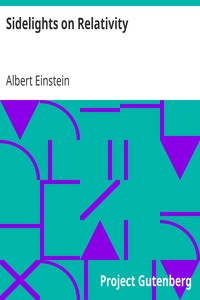Sidelights on Relativity by Albert Einstein
"Sidelights on Relativity" by Albert Einstein is a scientific publication composed of two addresses delivered in the early 20th century. The book explores the foundational concepts of relativity, addressing topics such as the nature of ether and its relation to gravitational and electromagnetic fields, as well as the implications of different geometries in understanding physical reality. It serves as an accessible introduction to Einstein's revolutionary ideas that reshaped our understanding of space,
time, and the nature of the universe. In "Ether and the Theory of Relativity," Einstein examines the historical context of the ether hypothesis and discusses its evolution within physics, ultimately questioning its necessity in light of the special theory of relativity. He explains how the traditional mechanical understanding of the ether was transformed by new insights, leading to the conclusion that the electromagnetic fields could exist independently of a physical medium. In the second address, "Geometry and Experience," Einstein delves into the relationship between geometry and physical reality, reflecting on how practical geometry can only be validated through experiential observation. He argues that while pure mathematical concepts provide a logical basis for geometry, they must be contextualized with physical laws to produce meaningful assertions about the natural world. Through these discussions, Einstein elucidates his groundbreaking views on the interconnectedness of geometry, physics, and our understanding of the universe. (This is an automatically generated summary.)
Read or download for free
| How to read | Url | Size | |||
|---|---|---|---|---|---|
| Read now! | https://www.gutenberg.org/ebooks/7333.html.images | 76 kB | |||
| EPUB3 (E-readers incl. Send-to-Kindle) | https://www.gutenberg.org/ebooks/7333.epub3.images | 122 kB | |||
| EPUB (older E-readers) | https://www.gutenberg.org/ebooks/7333.epub.images | 121 kB | |||
| EPUB (no images, older E-readers) | https://www.gutenberg.org/ebooks/7333.epub.noimages | 92 kB | |||
| Kindle | https://www.gutenberg.org/ebooks/7333.kf8.images | 250 kB | |||
| older Kindles | https://www.gutenberg.org/ebooks/7333.kindle.images | 241 kB | |||
| Plain Text UTF-8 | https://www.gutenberg.org/ebooks/7333.txt.utf-8 | 71 kB | |||
| Download HTML (zip) | https://www.gutenberg.org/cache/epub/7333/pg7333-h.zip | 121 kB | |||
| There may be more files related to this item. | |||||
Similar Books
About this eBook
| Author | Einstein, Albert, 1879-1955 |
|---|---|
| Uniform Title | Äther und Relativitäts-Theorie + Geometrie und Erfahrung Englisch |
| Title | Sidelights on Relativity |
| Note | Reading ease score: 44.9 (College-level). Difficult to read. |
| Credits |
Produced by David Starner, William Fishburne and the Online Distributed Proofreading Team. |
| Language | English |
| LoC Class | QC: Science: Physics |
| Subject | Relativity (Physics) |
| Category | Text |
| EBook-No. | 7333 |
| Release Date | Jan 1, 2005 |
| Most Recently Updated | Jan 27, 2021 |
| Copyright Status | Public domain in the USA. |
| Downloads | 257 downloads in the last 30 days. |
| Project Gutenberg eBooks are always free! | |

